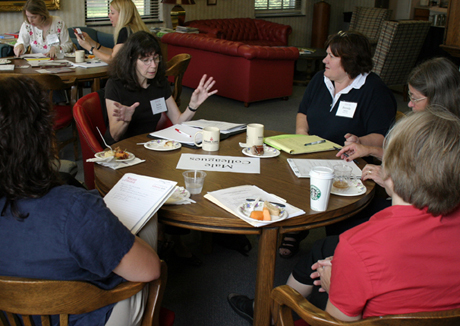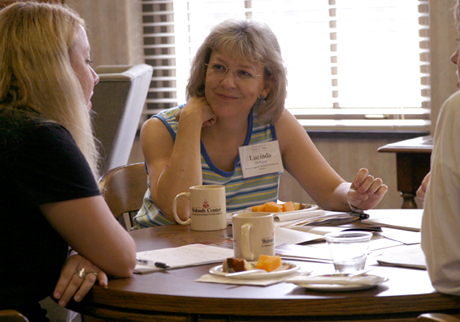 A little more than 30 years after the first female voting faculty member was hired at Wabash College, 30 women who teach at two of the country's three remaining liberal arts colleges for men gathered September 10-11 for the first Conference for Hampden-Sydney and Wabash Women Faculty and Staff.
A little more than 30 years after the first female voting faculty member was hired at Wabash College, 30 women who teach at two of the country's three remaining liberal arts colleges for men gathered September 10-11 for the first Conference for Hampden-Sydney and Wabash Women Faculty and Staff.
"The weekend was a big success for all of us," said Hampden-Sydney Associate Professor of English Sarah Hardy of the two-day gathering at Wabash, which included small-group and plenary sessions focusing on student development, attitudes towards women, and nurturing women's success at colleges for men.
"We certainly accomplished our goal of increasing our awareness of the contributions of women to colleges for men," said conference organizer Lucinda Huffaker, director of the Wabash Center for Teaching and Learning in Theology and Religion. " Our conversations brought into focus things that both colleges are doing well, while also helping us to recognize areas that can be improved for the education of the young men who choose to attend a college for men."
Huffaker noted that comparing women's experiences at the two schools was illuminating.
"We discovered both similarities and differences between the two schools, and those enabled us to think creatively about best practices for the important, unique role played by women working at these colleges. We also agreed that it was essential that students be more aware of their gendered identities and sensitive to differences among persons.
"Women on both campuses are planning to continue discussing ways to share what we're learning through workshops, web sites, visiting speakers, and forums," Huffaker added, noting that the group hopes to meet again and perhaps host a larger conference for colleges for men and co-ed schools with large percentages of male students.
"We are grateful that Wabash College and the Center of Inquiry in the Liberal Arts supported the meeting," Huffaker concluded. "I'm confident that the work we began will significantly enhance education for our students."